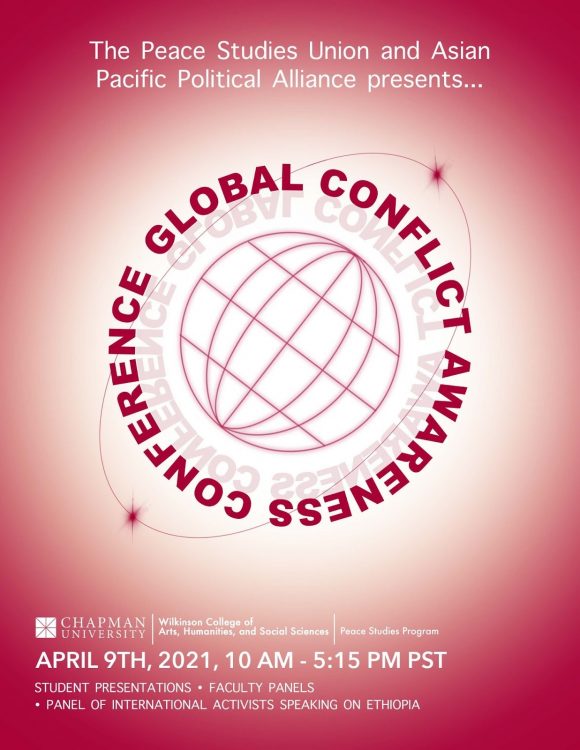Global Conflict Awareness Conference
April 22, 2021
On Friday, April 9th, Peace Studies seniors Emily Lam ‘21 and Sophia Morrissette ‘21 co-ran the first ever student-led Global Conflict Awareness Conference. The conference featured a full-day virtual experience with over 20 student presenters, six contributing faculty members, and three international activists, representing the conflicts of over 50 countries.
How do two seniors end up running an entire conference dedicated to global conflict awareness? The idea originated from two distinct experiences: first, the Center for Global Education’s annual study abroad fair, and second, the widespread protests and civil resistance movements happening around the globe. Lam and Morrissette were inspired by The Center for Global Education’s efforts to promote different programs and learning opportunities across the globe.
Lam and Morrissette were struck by how protests in Hong Kong were growing and capturing the attention of every media outlet, while western media ignored protests in Chile. Lam had only found out about the Chilean protests from a Chilean friend.
As a result, Lam and Morrissette sought to build from the open, dialog-centered structure of the study abroad fair, but instead of sharing programs of study, students could have a venue to share ongoing global conflicts and issues that impact their lives. This idea became the root of the Global Conflict Awareness Conference.
 The main goals for the conference were to build awareness about global conflicts not widely reported in the U.S. news cycle, inspire others to take action regardless of proximity to the conflicts, provide an opportunity for students to present their research from various courses, and finally, and perhaps most important, give voice to the human aspects of conflict that is not often heard in mainstream media, if a discourse exists at all.
The main goals for the conference were to build awareness about global conflicts not widely reported in the U.S. news cycle, inspire others to take action regardless of proximity to the conflicts, provide an opportunity for students to present their research from various courses, and finally, and perhaps most important, give voice to the human aspects of conflict that is not often heard in mainstream media, if a discourse exists at all.
Six student sessions focused on a number of topics, including Ethnic Conflicts in Central Africa, Human Rights Violators, Middle East Tensions, and Intersectionality and Conflict. The conference also featured a faculty session titled, “COVID on the Ground: The Impact of COVID-19 in Global Conflicts and Peace Building,” where Chapman faculty discussed the impact of the global pandemic in their areas of expertise.
Given the fact this was the conference’s pilot year, and the difficulties faced by Lam and Morrissette organizing a conference without ever once being physically together in the same room, by all accounts the conference was a huge success.
One of the main concerns while planning the event was attendance; however, not only was the attendance greater than anticipated, the conference was able to reach people outside the Chapman community.
“When we first started this work,” Morrissette wrote, “I don’t think either of us knew how much stress and late nights it would take to organize. Through it all, we have learned the art of emailing, patience, and cooperative efforts. This project has become our own capstone project in a way, and a very fulfilling journey.”
Lam and Morrissette go on to say, “We hope this conference will become an annual tradition within the Peace Studies department or Wilkinson College, and that the Peace Studies Union and Asian Paccific Political Alliance will remain involved. We hope in the coming years, when it is safe to be together again, the conference will be circulated wider amongst other Chapman’s colleges and majors, and will remain an opportunity for all students to present their research.”
Lastly, they hope the Global Conflict Awareness conference will continue to be a space that fosters further dialogue and action.
Special thanks to the Peace Studies Department and faculty, Dr. Hilmi Ulas, and the executive members of the Peace Studies Union and the Asian Pacific Political Alliance for supporting the initiative.


